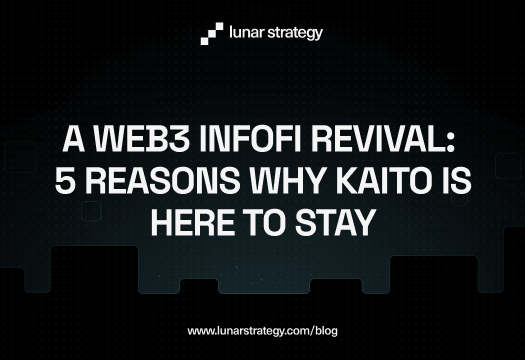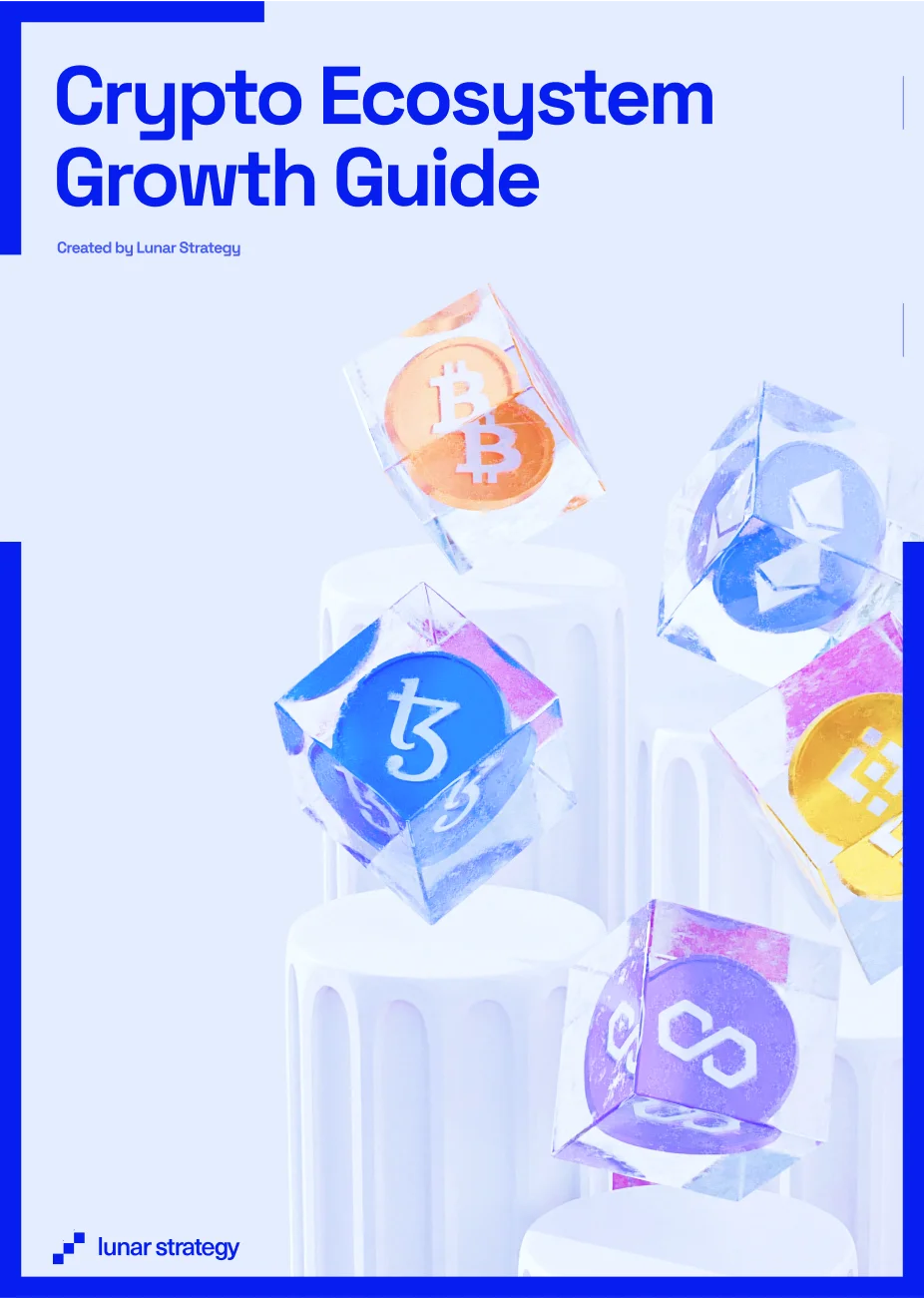In the version of web3 we’re familiar with in 2024, we’ve understood that this is a space that’s constantly seeking innovative ways to raise funds and gain visibility. One strategy that has gained significant traction is KOL fundraising.
This approach uses the influence and reach of respected figures within the crypto community to support and promote projects during their fundraising rounds. In this article, we'll dive into the world of KOL fundraisers, explore its dynamics and provide insights for startups looking to navigate this exciting territory.
Today, we’re taking a deeper dive at understanding KOL fundraising and also sharing some info straight from within Lunar Strategy, as our CMO and Head of Influencer Marketing, Jack Haldorsson shares valuable insights with the community.
Understanding KOL Fundraising
KOL fundraising is a unique collaboration between crypto projects and influential individuals who have established credibility and a strong following within the blockchain ecosystem. These KOLs, often thought leaders, industry experts, or popular content creators, use their platforms to showcase and endorse promising projects to their audience.
By aligning with KOLs, startups aim to tap into their vast networks, boost their visibility, and attract potential investors who trust the opinions of these respected figures.
The Power of Influencers
In the crypto space, where trust and credibility are paramount, the endorsement of a well-regarded KOL can be a game-changer for a startup. KOLs (influencers) have built their reputations through consistent engagement, valuable insights, and a track record of supporting successful projects. When a KOL puts their weight behind a particular startup, it sends a strong signal to the community that the project is worth paying attention to. This stamp of approval can be the catalyst that drives significant interest and investment.
Choosing the Right KOLs
- Be strategic in selecting KOLs whose values, expertise, and audience align with the project.
- Research potential KOLs' engagement, content quality, and collaboration history.
- Ensure the partnership feels authentic and organic.
Crafting Compelling Narratives
- Work closely with KOLs to create narratives that resonate with the shared audience.
- Clearly articulate the project's vision, value proposition, and the problem it solves.
- Co-create content that educates, inspires and sparks conversation.
Transparency and Trust
- Startups must be open and honest about project goals, tokenomics, and use of funds.
- KOLs should conduct due diligence and only support projects they genuinely believe in.
- Maintain the highest standards of integrity throughout the fundraising process.
Nurturing Long-Term Relationships
- Approach KOL fundraising with a long-term perspective, focusing on mutual growth and success.
- Continue engaging with KOLs beyond the initial fundraising round.
- Foster genuine connections and show appreciation for their support.
Measuring Success
- Define and track key metrics to gauge the success of a KOL campaign.
- Monitor website traffic, social media engagement, community growth, and funds raised.
- Regularly assess metrics and gather feedback to refine the approach and optimize efforts.
Insights From Lunar CMO Jack Haldorsson
Now, here are a few questions that pop up frequently when it comes to navigating fundraising in crypto. Our CMO, Jack Haldorsson has taken some time to address these FAQs and shares some of our collective experiences learned from our years of innovating in web3 capital & fundraising.
Q1: Can you explain the current landscape of fundraising in the crypto space and how it has evolved over the past few years?
Jack: The crypto fundraising landscape has undergone significant changes in recent years. Initially, Initial Coin Offerings (ICOs) were the dominant fundraising method, allowing startups to raise capital by issuing their own tokens.
However, the ICO boom was followed by increased regulatory scrutiny and a shift towards more compliant fundraising methods. Security Token Offerings (STOs) emerged as an alternative, offering a more regulated approach where tokens are treated as securities and comply with relevant laws. This has attracted institutional investors who appreciate the added layer of legal protection and oversight.
Initial Exchange Offerings (IEOs) have also gained popularity, where crypto exchanges act as intermediaries, vetting projects and conducting token sales on their platforms. This has provided a level of trust and credibility to the fundraising process.
Overall, the landscape has moved towards a more mature and compliant ecosystem, with an emphasis on transparency, investor protection, and adherence to regulatory frameworks.
Q2) What are the key challenges and opportunities that startups face when fundraising with crypto?
Jack: Startups embarking on crypto fundraising face several challenges. Regulatory uncertainty is a major hurdle, as the legal and compliance landscape varies across jurisdictions. Navigating this complex web of regulations requires significant resources and expertise.
Market volatility is another challenge, as the value of crypto can fluctuate greatly in short periods. This can impact the success of a fundraising campaign and the long-term stability of the raised funds.
On the other hand, fundraising with crypto presents unique opportunities. It allows startups to tap into a global pool of investors, democratizing access to capital. The decentralized nature of blockchain technology enables efficient and transparent fundraising processes, reducing intermediaries and costs.
Moreover, the technological advancements in the crypto space, such as smart contracts and tokenization, offer new possibilities for innovative fundraising models and investor engagement.
Q3) How does your company approach strategic partnerships and investor relations in the context of crypto fundraising?
Jack: Our company places great emphasis on building strong strategic partnerships and maintaining positive investor relations. We carefully select partners who align with our values, vision, and long-term goals.
This includes collaborating with reputable crypto exchanges, legal and compliance experts, and industry thought leaders. Transparency and open communication are key pillars of our investor relations strategy. We regularly provide updates on our project's progress, milestones, and any relevant developments.
Alongside this, we also prioritize investor education, providing resources and insights to help them make informed decisions. Building trust and fostering long-term relationships with our investors is crucial, especially in the volatile crypto market.
Q4) In your view, how significant is the impact of regulatory frameworks on strategic fundraising in crypto, and what changes do you foresee in the regulatory landscape?
Jack: Regulatory frameworks play a critical role in shaping the strategic fundraising landscape in the crypto space. Clear and well-defined regulations provide certainty and stability, which is essential for attracting institutional investors and mainstream adoption.
Compliance with anti-money laundering (AML) and know-your-customer (KYC) regulations is non-negotiable for legitimate crypto projects. Adhering to these standards helps build trust and credibility with investors and regulators alike.
Looking ahead, I anticipate a more harmonized global regulatory landscape for crypto. Governments and regulatory bodies worldwide are actively working on creating frameworks that balance innovation and investor protection. This may include clearer guidelines on token classifications, licensing requirements for crypto businesses, and standards for reporting and disclosure.
Q5) What innovative technologies or methods do you believe will shape the future of fundraising in the crypto sector?
Jack: The future of crypto fundraising is gearing up for transformative changes, driven by advancements in DePIN, DeFi, NFTs, Blockchain scalability and interoperability, and the integration of AI and machine learning.
DeFi platforms are streamlining the fundraising process by removing intermediaries and lowering costs, allowing broader investor participation through mechanisms like token sales and initial DEX offerings. NFTs offer new fundraising models through the tokenization of unique digital assets, enabling fractional ownership and crowdfunding.
Enhanced blockchain performance will support more transactions and complex fundraising activities, while cross-chain interoperability broadens investor reach. AI and machine learning are refining investor matching and risk assessment, optimizing fundraising strategies.
Security Token Offerings (STOs) are merging traditional securities’ benefits with blockchain's efficiency, attracting institutional investors with regulatory compliance. As the sector matures, a blend of traditional and innovative fundraising methods will emerge, dependent on robust regulatory frameworks and industry collaboration to ensure a sustainable and trustworthy ecosystem
Conclusion
The world of KOL fundraising is an exciting frontier for crypto startups. By partnering with influential voices, crafting compelling narratives, and prioritizing transparency and long-term relationships, projects can unlock new avenues for growth and success.
If you’re looking for any guidance regarding fundraising with KOLs, influencers, or thought leaders in the crypto space, feel free to give us a direct discovery call. We’d be more than happy to help.













Subscribe to receive recent articles



















.png)

.webp)
.webp)












